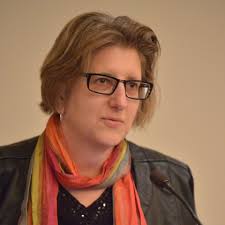Talking Biopolitics with Virginia Espino, Renee Tajima-Peña and Alexandra Minna Stern.
Renee Tajima-Peña and Virginia Espino, director and producer of the documentary No Más Bebés, will be talking with Alexandra Stern about their film, their research and California's sterilization history. This live online event is part of Talking Biopolitics 2016, a series of conversations with cutting-edge thinkers about the social meanings of human biotechnologies. For updates and background materials, check out the Facebook event page. We'll livetweet the conversation on Twitter using #TalkingBiopolitics.
About the Movie
They came to have their babies. They went home sterilized. The story of immigrant mothers who sued county doctors, the state, and the U.S. government after they were pushed into sterilizations while giving birth at the Los Angeles County-USC Medical Center during the 1960s and 70s. Led by an intrepid, 26-year-old Chicana lawyer and armed with hospital records secretly gathered by a whistle-blowing young doctor, the mothers faced public exposure and stood up to powerful institutions in the name of justice."
About the Filmmakers
 |
Renee Tajima-Peña, Producer/Director Academy Award-nominated filmmaker whose directing credits include the nationally televised documentaries, Calavera Highway (PBS), "The Mexico Story" of The New Americans series (PBS), My Journey Home (PBS), Labor Women (PBS), My America...or Honk if You Love Buddha (PBS), The Last Beat Movie (Sundance Channel), The Best Hotel on Skid Row (HBO), and Who Killed Vincent Chin? (PBS). Her films have premiered at festivals around the world including Cannes, San Francisco, Sundance, Toronto, and the Whitney Biennial. Among her honors are a Peabody Award, a duPont-Columbia Award, the Alpert Award in the Arts for Film/Video, International Documentary Association Achievement Award, and two Rockefeller Foundation fellowships in documentary film. Tajima-Peña is a USA Broad Fellow in media arts, and a professor and graduate director of the social documentation program at the University of California, Santa Cruz. |
|
Virginia Espino, Producer Prolific oral historian and educator, the idea for No Más Bebés originated with Virginia Espino’s original research on the coercive sterilizations of Mexican-origin women at Los Angeles County-USC Medical Center. Her primary research and interviews were published in Las Obreras: Chicana Politics of Work and Family, and Latinas in the United States: A Historical Encyclopedia. Espino has been the recipient of a Woodrow Wilson Dissertation Grant in Women’s Health, Ford Dissertation Fellowship for Minorities, Smithsonian Institution Minority Fellowship, Smithsonian Institution and the Inter-University Program for Latino Research Fellowship, and an Irvine Fellowship. She has served as a California Commissioner on the Commission for Sex Equity, Los Angeles, and a member of the Chicano/Latino Education Committee, Los Angeles. She is currently program coordinator for Latina & Latino History at the UCLA Center for Oral History Research. |
 |
About the Moderator
 |
Alexandra Minna Stern (interviewer) PhD, is Professor of Obstetrics and Gynecology, American Culture, and History at the University of Michigan, Researcher in the Program on Sexual Rights and Reproductive Justice, and a core faculty member in Latina/o Studies, whose research has focused on the history of eugenics, genetics, society, and justice in the United States and Latin America. She is the director of the Center for Latin American and Caribbean Studies , co-director of the Reproductive Justice Faculty Program based at the Institute for Research on Women and Gender. She has written about the history of public health, infectious diseases, and tropical medicine. She is the author of Telling Genes: The Story of Genetic Counseling in America (Johns Hopkins University Press, 2012), Eugenic Nation: Faults and Frontiers of Better Breeding in Modern America (University of California Press, 2005), and co-editor of Formative Years: Children's Health in the United States, 1880-2000 (Ann Arbor: University of Michigan Press, 2002). |



